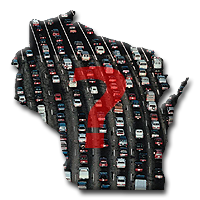With a  promised audit of WISDOT in the works, now is a good time to reflect on how conservatives on Wisconsin’s joint audit committee think about transportation. I have spent a lot of time trying to understand the arguments conservatives make against pedestrian, bicycle, and transit facilities. But each time I would crack one of their arguments with a solid counter-argument, another argument would quickly take its place. Since that time I have come to realize that conservative arguments against alternative transportation are not themselves the cause of conservative opposition, but rather a symptom of it.
promised audit of WISDOT in the works, now is a good time to reflect on how conservatives on Wisconsin’s joint audit committee think about transportation. I have spent a lot of time trying to understand the arguments conservatives make against pedestrian, bicycle, and transit facilities. But each time I would crack one of their arguments with a solid counter-argument, another argument would quickly take its place. Since that time I have come to realize that conservative arguments against alternative transportation are not themselves the cause of conservative opposition, but rather a symptom of it.
Back in 2008, Bill Richardson (active with the commuter rail opposition and a regular on talk radio) employed the argument that Bus Rapid Transit was the way to go instead of the proposed commuter rail line. But by 2013, with the commuter rail plan derailed by the legislature and the City of Madison proposing Bus Rapid Transit, Richardson changed his tune, and now took to the airwaves against what he had formerly supported as the better alternative to commuter rail. Why did he change his position on BRT?
A lot of liberals accuse conservatives of hating transit, bicycling, and walking, but the motivation for many conservatives is a little more nuanced: Conservatives are uncomfortable with the prospect of changing the built environment from what they learned to navigate as a young adult. The conservative aversion to new experiences is a well-researched topic by social psychologists. If you keep conservative social psychology in mind, seeing the motivation of their transportation arguments becomes simple.
When I first contacted Bill Richardson in 2008, I asked him if he could provide me with some information that I could use to help inform my liberal friends. Bill assumed (as I intended) that I was a conservative looking to convince liberals of the folly of commuter rail. What he sent me was a link to a book entitled The Road More Traveled .
I skimmed what I could from the book, and was astounded to see no discussion of the demerits of transit, (like where it works, where it doesn’t, and how to frame arguments against it). Instead, The Road More Traveled is a manifesto for focusing transportation resources on expanding road capacity. At the time, I thought Bill was just supremely ignorant about transit. But now I realize the book outlines the conservative dream for the future: easily navigable roads with no congestion, no traffic calming, or pesky bicyclists to back things up. In fact, in early 2011, two of Madison’s talk radio hosts chose the premise of “since Walker has been elected, you will now drive. Transit and its attendant subsidies are only for those unfortunate souls who cannot afford an automobile” for an hour of talk.
The irony is that the budget that was signed by Scott Walker that year resulted in local road subsidies rising to 83%, while transit’s subsidy sank to 60%. If conservatives were really as opposed to limiting subsidies as their anti-transit talk suggests, shouldn’t our talk radio hosts have told us to use the bus? But of course, the subsidy argument isn’t the point – the point is conservatives want the idyllic driving experience, no matter the cost. And in fact, since Walker took office, he has signed over more than $1.4 billion dollars from the general fund into transportation, an amount that exceeds what remained to be paid back of “Doyle’s Raids” by about $1 billion.
Given these hard facts, how can alternative transportation advocates make a compelling case to conservatives? Trying to counter the value and subsidy-based arguments were hear from legislators is pointless – they will just come up with other arguments in order to satisfy their desire for a roads-only future. The answer, I believe, is to argue based on the shared fundamental principles of life, liberty, and the pursuit of happiness; to show conservatives that their roads-only infrastructure desires are in conflict with their identity as defenders of freedom, and that state policies are limiting the ability of local governments to give the people the liberty promised to all in the pledge of allegiance.







